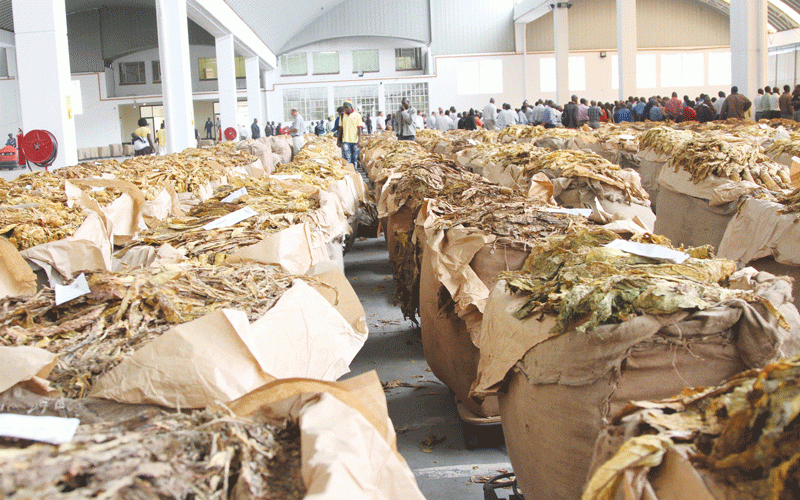
Farmers have welcomed the decision by the central bank to localise tobacco production funding, saying the move will go a long way in cutting down cost and boost output.
According to the Reserve Bank of Zimbabwe (RBZ)’s mid-term policy statement, there will be no restrictions on the use of locally sourced funds to support the production of tobacco in the country.
Considering this development, the Exchange Control (Tobacco Finance) Order, Statutory Instrument 61 of 2004 shall be amended to take account of this change.
In terms of Section 4 of the Exchange Control (Tobacco Finance) Order, Statutory Instrument 61 of 2004, tobacco merchants are required to source offshore financing to produce and buy back green leaf tobacco.
Tobacco merchants who fail to secure offshore financing are now required to apply to the apex bank for authority to raise funds on the local market.
The offshore pre-financing arrangement means tobacco merchants bring into the country part of export proceeds in the form of inputs. After exports, the bulk of the export proceeds are used to pay offshore loans.
Currently, about 95% of Zimbabwean tobacco production is financed using offshore loans under contract farming.
Tobacco farmers have turned to contract farming as a result of the lack of available funding. Due to this, farmers have been caught in a vicious cycle of taking out loans from tobacco companies to finance their operations.
- RBZ blocks Harare US dollar charges
- Industry cries foul over new export surrender requirements
- One stitch in time saves nine
- Banks keep NPLs in safe territory
Keep Reading
The loans are coming with a catch - they are tied to a contract that requires the farmers to sell their tobacco exclusively to that company.
This year, again, the farmers found themselves unable to service their loans. This means they were going to be forced to sign another contract, effectively binding them to the company for another season.
The threat of losing their properties or being taken to court hung over their heads like a Damocles sword.
With the localisation of tobacco production funding, farmers believe the cost of production will be reduced.
“We are happy to hear the monetary policy from the RBZ on the localisation of tobacco funding and we are hoping that this will help cut the cost of production for the farmers,” Zimbabwe Tobacco Growers Association president George Seremwe told Standardbusiness.
“At the same time, it will increase competition on the market whereby we'll probably see our prices also increasing since there will be competition. That is our hope.
“We are also happy that the local banks can participate using locally sourced funds to participate in the tobacco production value addition and that will increase the local component of the production of tobacco into manufacturing of cigarettes.”
He added: “We hope as well that we'll also see our farmers benefiting. Of course, it’s more favouring the merchants and the buyers who are going to be more directly benefiting and we are hoping they are going to be kind enough to share the benefit with the farmer for the sustainability of the tobacco production.
“So, it's a welcome development. We are happy with that and we applaud the government for taking such an initiative.”
He said since the government was going to benefit through taxes and levies, it should also provide farmers with incentives.
“Our biggest concern has been the cost of production,” Seremwe said. “ It is extremely high. Fertilisers, chemicals, diesel and labour are quite high in the tobacco production. So, we are hoping that we will be benefiting from such an initiative,” he said.
Zimbabwe Commercial Farmers Union president Shadreck Makombe said: “This was long overdue because it gives people choice as opposed to the current situation where farmers are tied to contractors in terms of manoeuvrability, they are limited.”
“So, with that one, it's liberalisation, meaning other players can come in and be in a position also to sponsor some other farmers. As it stands, it's quite a good move in that it gives flexibility to farmers,” he said.
The 2023 tobacco auction marketing season officially closed on July 31, 2023, according to the Tobacco Industry and Marketing Board (TIMB).
However, the contract floors and delivery sites, which handle roughly 95% of the crop, will continue to remain in operation until all of the tobacco has been delivered. According to TIMB statistics, 19,9 million kilogrammes of tobacco worth US$56,9 million had been sold through the auction floors at the official closure of auction floors.
A total of 295,4 million kg of tobacco worth US$837,8 million had been sold on the contract floors as of August 11, 2023.
The southern Africa nation has made a total of US$894,8 million, an increase of 41,97% over the previous year.











